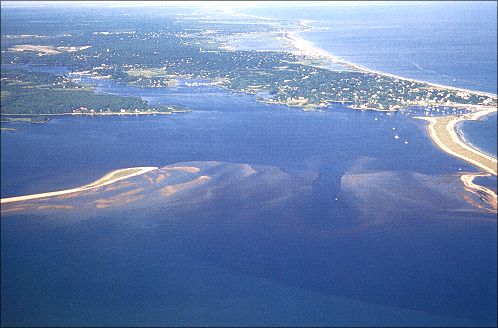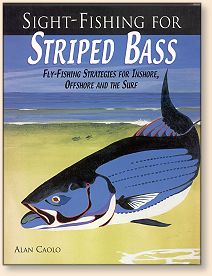Offshore sight-fishing is often compared to flats
fishing in tropical locations, such as the Florida
Keys. As their name implies, these flats are
located some distance off shore and must be accessed
by boat. Once anglers have reached the fishing grounds
they may fish them from the skiff, to cover large areas,
or disembark to stalk specific areas on foot.
In addition to mobility, fishing from a skiff has
other advantages. Anglers achieve enhanced viewing
while standing several feet above the water on the
skiff's casting deck. They also benefit from an
experienced guide, whose trailed eyes are even higher
above the water when the boat is equipped with a poling
platform. Hence, fishing from a skiff is generally the
best option when working waters over two feet deep, or
to improve spotting when the viewing. Wading is most
effective in waters less than two feet deep when the
skiff's presence may alert stripers and put them off
the feed.

Off shore areas are best fished with an experienced
sight-fishing guide who knows the waters. Guides
know the fish and their habits, what flies are hot,
and where to be on these huge flats at any given time
to provide you the best opportunities on a given day.
There are several first-class sight-fishing guides
available in most regions that sport a sight-fishery
and I highly recommend utilizing these professionals.
A good guide is a good teacher and coach from whom you
can learn a lot in a day.
These areas should be attempted on your own only
after the area has been carefully surveyed. This
is accomplished by reviewing nautical charts, NOAA
current charts (if available) and speaking with
locals to get a feel for the waters. On many flats
the outgoing tide can easily leave a skiff high and
dry if you're careless. Be aware of all hazards that
can damage or strand boats venturing into these
areas - before you set out. Unless you're operating
a safe vessel that meets all U.S. Coast Guard rules
and regulations for inshore craft and draws 18 inches
of water or less, you shouldn't consider going on your own.

Offshore flats often lie within migratory routes
that striped bass follow as they travel northward
in the spring and southward in the fall. As a result,
large numbers of fish are consistently seen transiting
these flats each year. Encountering large striper
schools containing hundreds and even thousands of
fish on any given day is typical here during the
arly and late fringes of the season (May/June and
September/October). Numerous pods of trophy fish,
numbering 10 to 50 fish in a school, also pass
through at these times. In May or June the fish
are fresh off the spring migration and offshore
aters are still relatively cool. These early-season
stripers feed more actively and respond aggressively
to flies. As waters warm later on, the fish settle
down and become noticeably selective, less aggressive
feeders.
These flats are generously swept with clean, clear
ocean water, which supports a healthy, stable good
chain. Abundant food sources, consisting of
year-round resident prey within the bottom and
seasonal baitfish schools, hold large number of
migrating stripers for days or weeks at a time
for interim feeding. As a result, offshore flats
consistently produce outstanding sight-fishing
opportunities making the extra effort required
to get to them well worth it. ~ Alan Caolo
Credits: Excerpt and photo from Sight-Fishing
for Striped Bass Fly-Fishing Strategies for Inshore,
Offshore and the Surf, by Alan Caolo, Published by Frank
Amato Publications. We appreciate use premission. |


